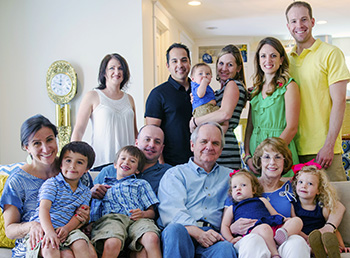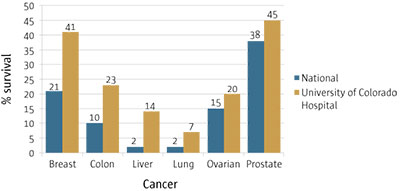Lung Cancer Treatment Shows Promise
CU Cancer Canter Survival Rates Outpace National Averages
By Vicki Hildner
 (
(
She traveled the world, indulging her love of art and art history. She celebrated the births of four more grandchildren. She married Ben Smith, the man she calls her “best friend.”
None of this seemed possible in June 2009 when she learned that the lung cancer, which had been initially diagnosed in 2008, had spread to her abdomen and brain.
“You hear ‘Stage IV’ and you say, ‘How many months or days do I have left?’” Smith says. “But between the Anschutz Medical Campus and the good Lord, I am still here.”
Ellen’s Story: Diagnosis
Smith called in late to work on April 1, 2008. She had a nagging cough, and her primary care physician, who suspected she might have pneumonia, sent her to the hospital for tests.
Smith did have pneumonia. She also had a mass in her left lung. Five biopsies later, she learned that she had non-small cell lung cancer. She was 58 years old, with no other health problems, and she had never been a smoker.
“After you hear the ‘c’ word, you just think that’s synonymous with death,” Smith says. “But I still felt like I had a lot to live for and a lot to do.”
Smith underwent chemotherapy to shrink the tumor, and in August 2008, surgeons removed her entire left lung. Five months later, when
Smith’s three adult children had been researching lung cancer, and their investigation led them to the website for the CU Cancer Center at the Anschutz Medical Campus, where they found a number they could call for a second opinion. The good news? D. Ross Camidge, MD,
She was in Scotland on what she thought might be a final vacation when her son called her with the news: She was a match for the clinical trial. “I went from terror to ‘Oh my gosh, there is hope,’” Smith says.
Ellen’s Story: Clinical Trial
Smith started the clinical trial at the end of July 2009. She was one of the first people in the world to take crizotinib, a potential anticancer drug, known as an ALK inhibitor, that is designed to block the gene driving the lung cancer. Two months later, Smith sat with two of her children, Camidge and Ben Smith, whom she had been dating since the summer of 2005, and they stared at PET scans of her entire body.
“
“Dr. Camidge said to me, ‘We cannot cure your cancer, but we can control it,’” Smith says. “I understood that this would be the new norm—living with cancer.”
A year later, Ben came over to Smith’s house with a serious look on his face. She suspected that their relationship was about to end, a casualty of cancer. Instead, he proposed with words that could easily double as vows. “I will be here with you and for you,” he said. “You’re not going to journey through this alone.”
Through the years, Smith’s cancer has gone through phases, sometimes outwitting the drugs. During those periods, she has had traditional infusion chemotherapy and radiation and then returned to an ALK inhibitor. When that drug stopped working, she began another clinical trial with a second-generation ALK inhibitor.
“Lung cancer has been treated as one disease for decades,” Camidge says. “We know now there are different types of lung cancer, so you can’t apply the dogma of the last 20 years. You need to be a clinical pioneer, looking over the next mountain, exploring. You’re on a journey with the patient, their family
 Smith praises Camidge for his willingness to “think outside the box and be open to all sorts of options” with her treatment.
Smith praises Camidge for his willingness to “think outside the box and be open to all sorts of options” with her treatment.
“Dr. Camidge is brilliant,” she says. “He is also compassionate. I think of him as my brother.”
Today, Smith has two missions: to enjoy every minute with her family (“I am a grandma who is gaga for her grandchildren.”) and to spread the word about the CU Cancer Center on the Anschutz Medical Campus.
“Anschutz is the place to go,” Smith says. “They know that when dealing with cancer, one size doesn’t fit all. It’s very personalized care, individualized to the type of cancer. It’s a whole new way of thinking.”
“Ellen has helped other people,” Camidge says. “The data we have published about her case has changed the world multiple times.”
CU Cancer Center: Personalized Care
CU Cancer Center is the only National Cancer Institute-designated comprehensive cancer center in the Rocky Mountain region. It is known for its personalized cancer treatments and its robust and diverse clinical research and clinical trials program. It is home to one of the world’s best lung cancer research and treatment programs.
“I think patients believe we provide compassionate expertise,” Camidge says. “We will go the extra 10 miles for every patient.”
With the largest number of human cancer clinical trials in the region, CU Cancer Center provides patients across the state and region with access to the newest possible types of cancer care.